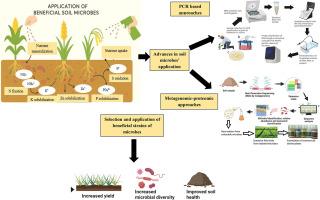土壤微生物资源:解锁作物生产力和土壤健康的可持续战略
IF 5.8
Q1 MICROBIOLOGY
引用次数: 0
摘要
利用有效的根际微生物作为生物接种剂是促进农业可持续性的关键因素,因为这些微生物已被证明可以促进植物生长和作物生产力。土壤微生物群落为作物提供了许多好处,包括提高养分吸收效率,植物激素生产,改善土壤结构,养分平衡,增强植物和土壤健康,防止土壤传播的植物病原体,提高植物对非生物和生物胁迫的抵御能力。根际微生物的这些特性引起了研究人员的关注,因为单独或联合使用这些微生物可以以生态友好的方式提高土壤肥力和土壤健康。此外,利用多组学技术探索有益植物生长促进微生物的潜在潜力是在不断变化的气候条件下产生新的生物制剂的新方法之一。因此,本文将重点介绍微生物的多样性,它们对植物生长和产量的贡献,以及高效生物接种剂的筛选和开发技术的进展,并特别强调促进可持续农业实践。本文章由计算机程序翻译,如有差异,请以英文原文为准。

Soil microbial resources: Unlocking sustainable strategies for crop productivity and soil health
Using efficient rhizospheric microbes as bio-inoculants is a key factor in promoting agricultural sustainability, as these microbes have been shown to enhance plant growth promotion and crop productivity. Soil microbial communities offer numerous benefits to crops, including improved nutrient uptake efficiency, phytohormone production, improved soil structure, nutrient balance, enhanced plant and soil health, protection against soil borne phyto-pathogens and increased plant resilience to abiotic and biotic stresses. These characteristics of rhizospheric microbes have attracted researcher's attention, as using these microbes individually or in consortia has enhanced soil fertility as well as soil heatlh in a eco-friendly manner. Further, the utilization of multi-omics techniques for exploring the hidden potential of beneficial plant growth promoting microbes is one of the novel approaches that can result in the generation of new biological formulations under changing climatic conditions. This review is therefore focused on the diversity of microbes, their contributions for plant growth promotion and yield with advances in techniques for screening and development of efficient bio-inoculant with a special emphasis on promoting sustainable agriculture practices.
求助全文
通过发布文献求助,成功后即可免费获取论文全文。
去求助
来源期刊

Current Research in Microbial Sciences
Immunology and Microbiology-Immunology and Microbiology (miscellaneous)
CiteScore
7.90
自引率
0.00%
发文量
81
审稿时长
66 days
 求助内容:
求助内容: 应助结果提醒方式:
应助结果提醒方式:


